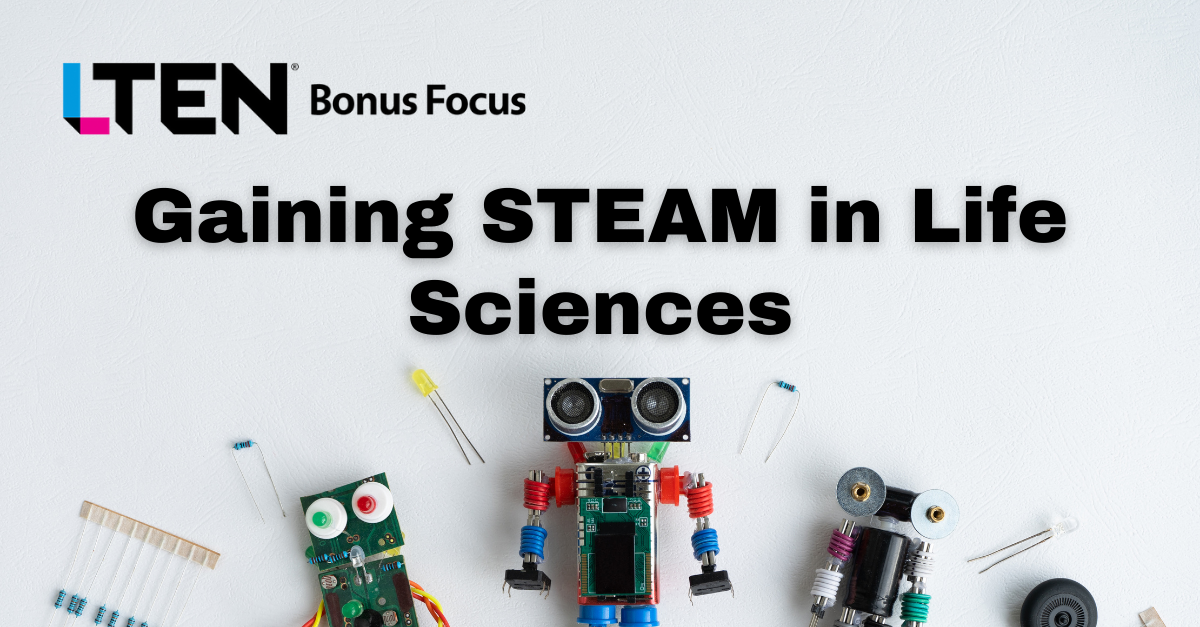
By Mary Barlow
Strategic innovation advisor Alex Manu first coined the “imagination gap” as the difference between current capability and future possibility. Manu and many researchers assert that to solve our biggest challenges, we must incorporate creative thinking into the scientific perspective.
In fact, the trend is gaining such momentum that educators at University of San Diego and elsewhere are adding an A to STEM (science, technology, engineering and math). The A of course stands for art, changing the acronym to STEAM.
This addition is because art complements science. Playing piano, painting, writing novels and poetry, woodworking, crocheting and other creative pursuits improve problem-solving, boost design skills and help us focus longer with greater precision.
“Most Nobel Prize winners and members of the U.S. National Academies pursued interests such as arts, theater or creative writing,” said Amber Dance in her February 2021 Nature article, Art Graft: Putting the A into STEMM (science technology, engineering, math and medicine). “And STEMM graduates of the Honors College at Michigan State University were more likely to have licensed patents and founded companies if they also enjoyed arts or crafts.”
Creating a Culture
An ongoing commitment to employees’ personal development in the arts can create a culture where new skills and knowledge lead to novel ideas, something all corporations can welcome. Gosha Levochki, artist and founder of Dirty Hands, said that one hour of painting helps his adult art students solve problems at work.
“Creating art can inspire you to bring new ideas to the table at work, to challenge the status quo and to suggest different ways of doing things,” said Levochkin. “This will benefit not only your own career but also the entire company.”
The Right Resources
For most of us interested in learning something new, we tend to start with the Internet. Whether we’re attempting to assemble outdoor wicker furniture or create a floral arrangement, how-to videos can guide the way.
However, according to Kevin Roose, a reporter with The New York Times and host of the Rabbit Hole podcast, the trouble with most internet algorithms is they’re built to give you mainly what they think you’re interested in from billions of indexed pages based on myriad factors. And the first content to pop up may not be what’s most relevant for you, but most advantageous for advertisers.
What if instead of such algorithms, information were curated by teachers, thought leaders, scientists or professors? While that type of search is not available on the World Wide Web, there are a growing number of portals that offer an array of comprehensive courses. In his Forbes article, The Rise of Online Learning, enterprise tech reporter Ilker Koksal noted that before the pandemic, online learning platforms were estimated to become a $350 billion business by 2025. It’s thought now this growth is accelerating even faster by the recent spike in remote work and education.
Safe to say there are lots of platforms to choose from, and many offer corporate packages. Here are several that may appeal to life sciences colleagues seeking to add a little STEAM to their STEM:
- Coursera: Offers a collection of online courses, certificates and degrees from leading universities. Topics covered: Data science, business, computer science, personal development, IT, and health; also art and humanities
- CreativeLive: Offers classes by individual experts sharing their insights and knowledge. Topics covered: Photography and video, drawing and illustration, graphic design, and crafts
- LinkedIn Learning: Provides expert-led courses. Topics covered: Business, creative, and technology
- MasterClass: Offers lectures, mostly by famous thought leaders, along with instructor guides. Topics covered: Filmmaking, cooking, writing, gardening, negotiation, wilderness survival, music, rock climbing, and more
- Next Big Idea Club: Provides a curated collection of 2 groundbreaking books a quarter; mails hard copies and emails eBooks and videos to members. Topics covered: An array of nonfiction books featuring innovative concepts and thinking
- The Great Courses: A series of lectures on individual subjects. Topics covered: How to dance, play piano, understand the periodic table, stay fit as you age, comprehend modern physics, and more
- Udemy: Provides a series of lectures and articles on each given topic; taught by industry experts. Topics covered: Design, development, marketing, IT and software, personal development, business, photography, and music
Conclusion
If you choose to offer a corporate package of online learning for your life sciences colleagues, remember that for optimal uptake, you must launch a robust and sustained communications campaign.
Always begin outreach with leadership and frontline managers to gain their perspectives and ensure they’re aligned. Then promote and release your program to a pilot group, so you can incorporate their input before sharing it with a larger audience.
Continue encouraging exploration with clever and fun reminders about available offerings. Then begin to realize all your company’s future possibilities.
Mary Barlow is a senior director of media production with Encompass Communications and Learning. Email Mary at mbarlow@encompasscnl.com.








